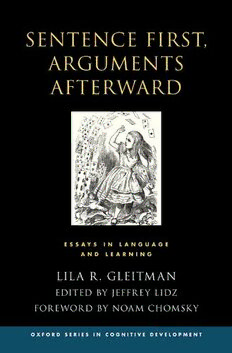
Sentence First, Arguments Afterward: Essays in Language and Learning PDF
Preview Sentence First, Arguments Afterward: Essays in Language and Learning
Sentence First, Arguments Afterward Oxford Series in Cognitive Development SERIES EDITORS Paul Bloom and Susan A. Gelman The Essential Child: Origins of Essentialism in Everyday Thought Susan A. Gelman The Foundations of Mind: Origins of Conceptual Thought Jean Matter Mandler Causal Learning: Psychology, Philosophy, and Computation Alison Gopnik and Laura Schulz The Origin of Concepts Susan Carey Making Minds: How Theory of Mind Develops Henry M. Wellman Core Knowledge and Conceptual Change Edited by David Barner and Andrew Scott Baron Sentence First, Arguments Afterward: Essays in Language and Learning Lila R. Gleitman Edited by Jeffrey Lidz Sentence First, Arguments Afterward Essays in Language and Learning LILA R. GLEITMAN Edited by JEFFREY LIDZ Foreword by NOAM CHOMSKY 1 3 Oxford University Press is a department of the University of Oxford. It furthers the University’s objective of excellence in research, scholarship, and education by publishing worldwide. Oxford is a registered trade mark of Oxford University Press in the UK and certain other countries. Published in the United States of America by Oxford University Press 198 Madison Avenue, New York, NY 10016, United States of America. © Oxford University Press 2020 All rights reserved. No part of this publication may be reproduced, stored in a retrieval system, or transmitted, in any form or by any means, without the prior permission in writing of Oxford University Press, or as expressly permitted by law, by license, or under terms agreed with the appropriate reproduction rights organization. Inquiries concerning reproduction outside the scope of the above should be sent to the Rights Department, Oxford University Press, at the address above. You must not circulate this work in any other form and you must impose this same condition on any acquirer. Library of Congress Control Number: 2020931356 ISBN 978– 0– 19– 982809– 8 1 3 5 7 9 8 6 4 2 Printed by Marquis, Canada To my children, who learned to speak, and occasionally to listen. Contents I. PRELIMINARIES Foreword xiii Noam Chomsky Acknowledgments xix Contributors xxi 1. From Structuralism to Cognitive Science: Lila R. Gleitman’s Contributions to Language and Cognition 1 Jeffrey Lidz II. WHAT DO THEY KNOW AND WHEN DID THEY KNOW IT? 2. The Impossibility of Language Acquisition (And How They Do It) 25 Lila R. Gleitman, Mark Y. Liberman, Cynthia A. McLemore, and Barbara H. Partee 3. A Study in the Acquisition of Language: Free Responses to Commands 57 Elizabeth F. Shipley, Carlota S. Smith, and Lila R. Gleitman 4. The Emergence of the Child as Grammarian 86 Lila R. Gleitman, Henry Gleitman, and Elizabeth F. Shipley 5. Language Use and Language Judgment 114 Henry Gleitman and Lila R. Gleitman III. WHERE DOES LANGUAGE KNOWLEDGE COME FROM? INPUT AND INNATENESS 6. Mother, I’d Rather Do It Myself: Some Effects and Non-E ffects of Maternal Speech Style 141 Elissa L. Newport, Henry Gleitman, and Lila R. Gleitman 7. Beyond Herodotus: The Creation of Language by Linguistically Deprived Deaf Children 178 Heidi Feldman, Susan Goldin- Meadow, and Lila R. Gleitman viii Contents 8. Every Child an Isolate: Nature’s Experiments in Language Learning 241 Lila R. Gleitman and Barbara Landau IV. HARD WORDS AND SYNTACTIC BOOTSTRAPPING A: ESTABLISHING PLAUSIBILITY 9. The Structural Sources of Verb Meanings 261 Lila R. Gleitman 10. On the Semantic Content of Subcategorization Frames 313 Cynthia Fisher, Henry Gleitman, and Lila R. Gleitman 11. Human Simulations of Vocabulary Learning 380 Jane Gillette, Henry Gleitman, Lila R. Gleitman, and Anne Lederer V. HARD WORDS AND SYNTACTIC BOOTSTRAPPING B: BUT IS IT TRUE? 12. Understanding How Input Matters: Verb Learning and the Footprint of Universal Grammar 431 Jeffrey Lidz, Henry Gleitman, and Lila R. Gleitman 13. Hard Words 463 Lila R. Gleitman, Kimberly Cassidy, Anna Papafragou, Rebecca Nappa, and John C. Trueswell 14. When We Think About Thinking: The Acquisition of Belief Verbs 508 Anna Papafragou, Kimberly Cassidy, and Lila R. Gleitman VI. EASY WORDS? NOT SO EASY 15. How Words Can and Cannot Be Learned by Observation 557 Tamara Nicol Medina, Jesse Snedeker, John C. Trueswell, and Lila R. Gleitman 16. Propose But Verify: Fast Mapping Meets Cross-S ituational Word Learning 575 John C. Trueswell, Tamara Nicol Medina, Alon Hafri, and Lila R. Gleitman 17. Quality of Early Parent Input Predicts Child Vocabulary 3 Years Later 623 Erica A. Cartmill, Benjamin F. Armstrong III, Lila R. Gleitman, Susan Goldin- Meadow, Tamara Nicol Medina, and John C. Trueswell Contents ix 18. The Easy Words: Reference Resolution in a Malevolent Referent World 641 Lila R. Gleitman and John C. Trueswell VII. WORDS AND CONCEPTS 19. What Some Concepts Might Not Be 669 Sharon Lee Armstrong, Lila R. Gleitman, and Henry Gleitman 20. Why Stereotypes Don’t Even Make Good Defaults 713 Andrew C. Connolly, Jerry A. Fodor, Lila R. Gleitman, and Henry Gleitman 21. Similar, and Similar Concepts 736 Lila R. Gleitman, Henry Gleitman, Carol Miller, and Ruth Ostrin 22. The Emergence of the Formal Category “Symmetry” in a New Sign Language 790 Lila R. Gleitman, Ann Senghas, Molly Flaherty, Marie Coppola, and Susan Goldin- Meadow 23. Turning the Tables: Language and Spatial Reasoning 809 Peggy Li and Lila R. Gleitman 24. Relations Between Language and Thought 843 Lila R. Gleitman and Anna Papafragou Index 879
